Impact of Organisation Behaviour on Team Dynamics and Motivation
VerifiedAdded on 2023/06/15
|19
|6626
|74
Report
AI Summary
This report analyses organisation behaviour within Barclays Bank and Argos, focusing on the impact of politics, culture, and power on individual and team performance. It elucidates motivation theories, such as Maslow's hierarchy and Herzberg's two-factor theory, and their implications for goal achievement. The study also examines the characteristics of effective teams and the application of organisational behaviour concepts in a business context. Furthermore, it evaluates the relevance of team development theories and philosophies in enhancing overall performance and productivity, providing a comprehensive overview of how these elements influence behaviour within organisations.
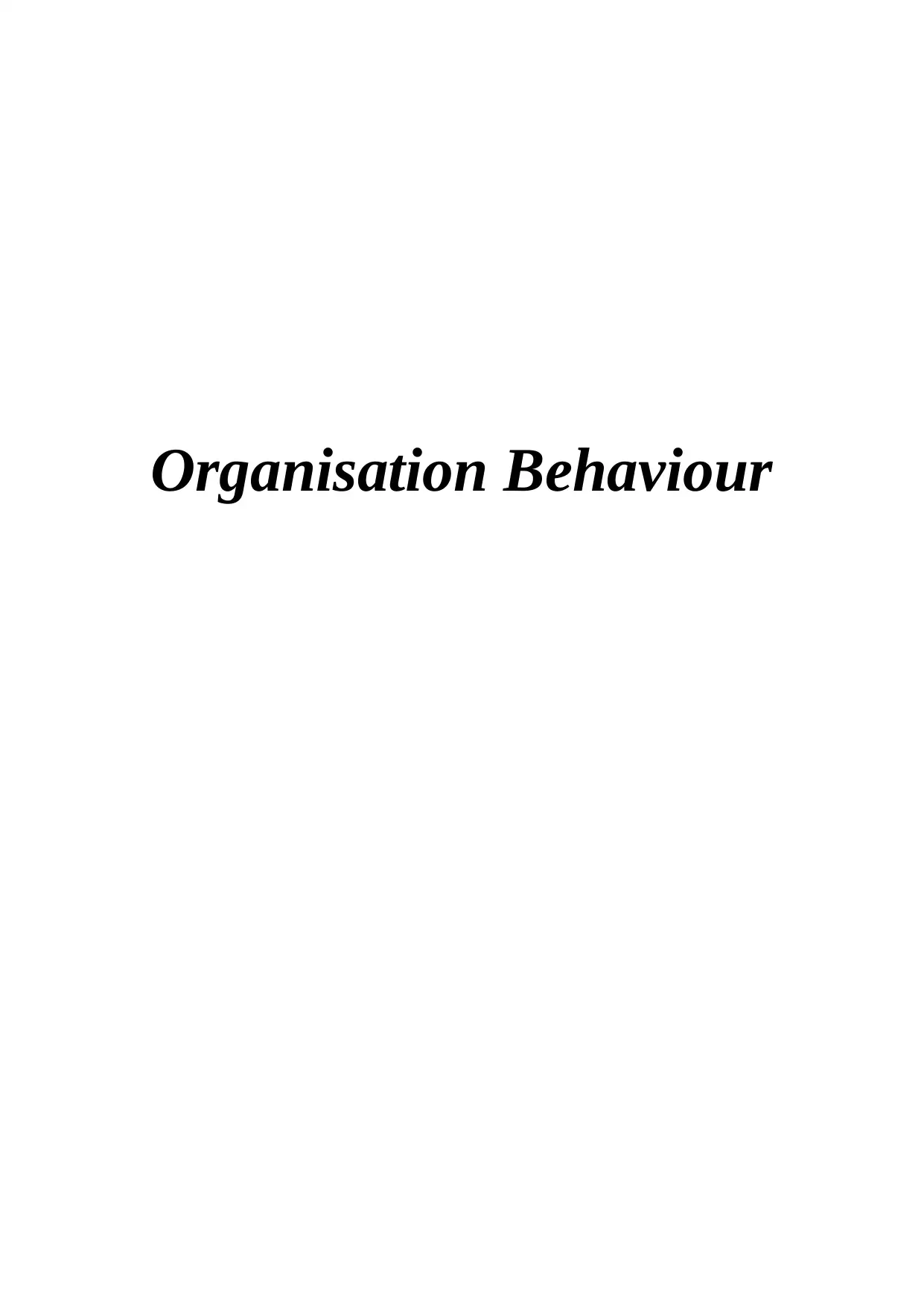
Organisation Behaviour
Paraphrase This Document
Need a fresh take? Get an instant paraphrase of this document with our AI Paraphraser
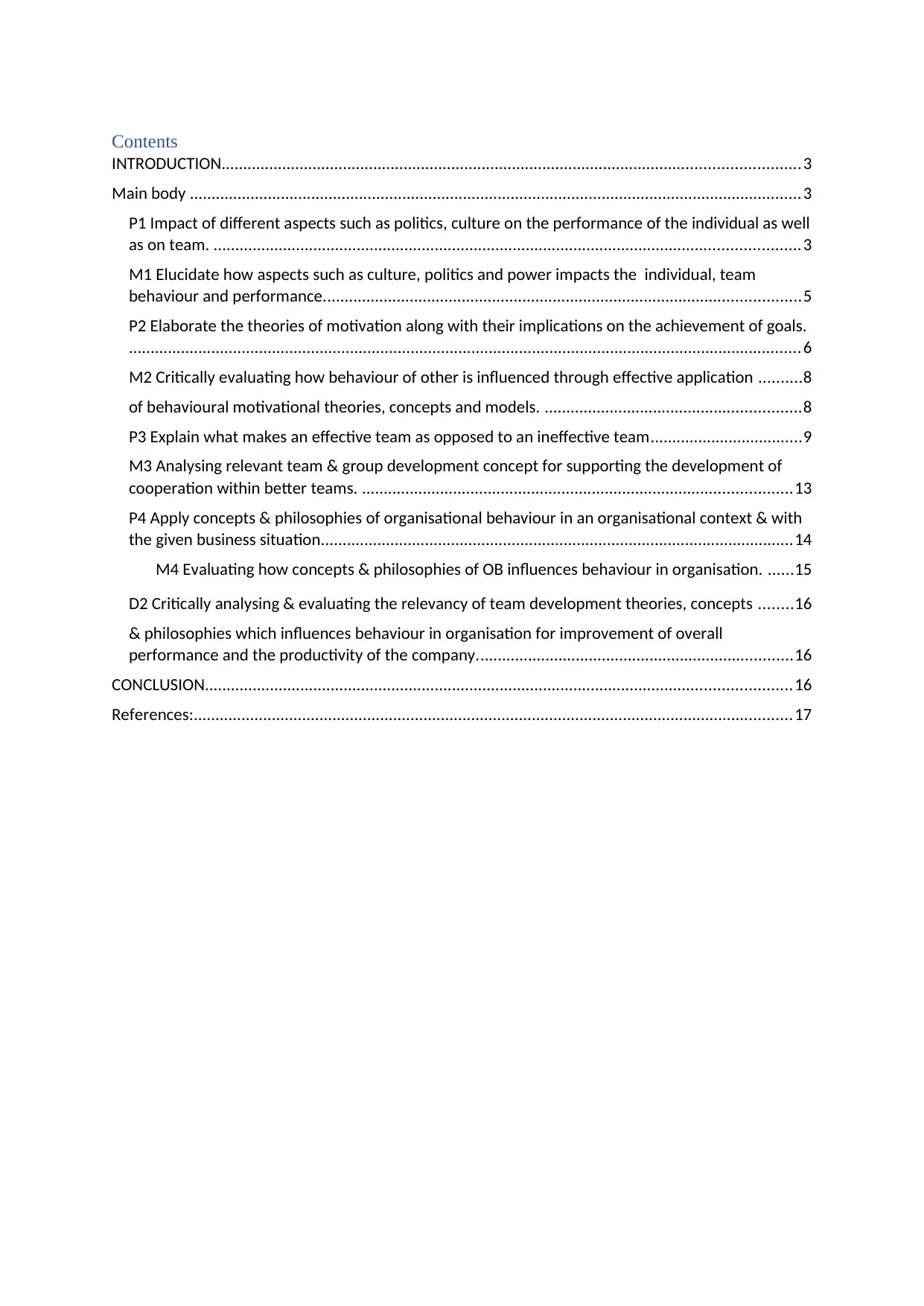
Contents
INTRODUCTION.....................................................................................................................................3
Main body .............................................................................................................................................3
P1 Impact of different aspects such as politics, culture on the performance of the individual as well
as on team. .......................................................................................................................................3
M1 Elucidate how aspects such as culture, politics and power impacts the individual, team
behaviour and performance..............................................................................................................5
P2 Elaborate the theories of motivation along with their implications on the achievement of goals.
...........................................................................................................................................................6
M2 Critically evaluating how behaviour of other is influenced through effective application ..........8
of behavioural motivational theories, concepts and models. ...........................................................8
P3 Explain what makes an effective team as opposed to an ineffective team...................................9
M3 Analysing relevant team & group development concept for supporting the development of
cooperation within better teams. ...................................................................................................13
P4 Apply concepts & philosophies of organisational behaviour in an organisational context & with
the given business situation.............................................................................................................14
M4 Evaluating how concepts & philosophies of OB influences behaviour in organisation. ......15
D2 Critically analysing & evaluating the relevancy of team development theories, concepts ........16
& philosophies which influences behaviour in organisation for improvement of overall
performance and the productivity of the company.........................................................................16
CONCLUSION.......................................................................................................................................16
References:..........................................................................................................................................17
INTRODUCTION.....................................................................................................................................3
Main body .............................................................................................................................................3
P1 Impact of different aspects such as politics, culture on the performance of the individual as well
as on team. .......................................................................................................................................3
M1 Elucidate how aspects such as culture, politics and power impacts the individual, team
behaviour and performance..............................................................................................................5
P2 Elaborate the theories of motivation along with their implications on the achievement of goals.
...........................................................................................................................................................6
M2 Critically evaluating how behaviour of other is influenced through effective application ..........8
of behavioural motivational theories, concepts and models. ...........................................................8
P3 Explain what makes an effective team as opposed to an ineffective team...................................9
M3 Analysing relevant team & group development concept for supporting the development of
cooperation within better teams. ...................................................................................................13
P4 Apply concepts & philosophies of organisational behaviour in an organisational context & with
the given business situation.............................................................................................................14
M4 Evaluating how concepts & philosophies of OB influences behaviour in organisation. ......15
D2 Critically analysing & evaluating the relevancy of team development theories, concepts ........16
& philosophies which influences behaviour in organisation for improvement of overall
performance and the productivity of the company.........................................................................16
CONCLUSION.......................................................................................................................................16
References:..........................................................................................................................................17
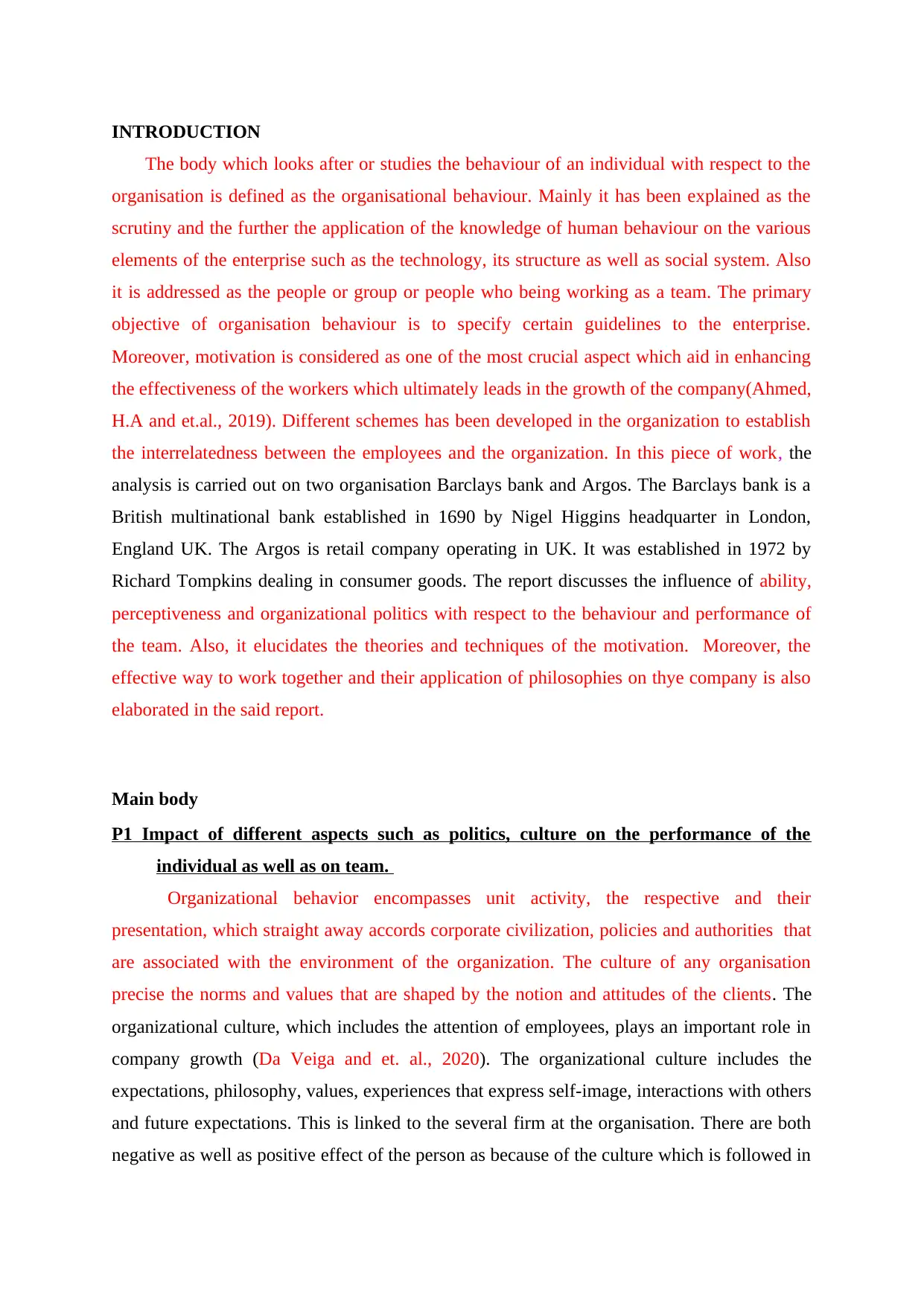
INTRODUCTION
The body which looks after or studies the behaviour of an individual with respect to the
organisation is defined as the organisational behaviour. Mainly it has been explained as the
scrutiny and the further the application of the knowledge of human behaviour on the various
elements of the enterprise such as the technology, its structure as well as social system. Also
it is addressed as the people or group or people who being working as a team. The primary
objective of organisation behaviour is to specify certain guidelines to the enterprise.
Moreover, motivation is considered as one of the most crucial aspect which aid in enhancing
the effectiveness of the workers which ultimately leads in the growth of the company(Ahmed,
H.A and et.al., 2019). Different schemes has been developed in the organization to establish
the interrelatedness between the employees and the organization. In this piece of work, the
analysis is carried out on two organisation Barclays bank and Argos. The Barclays bank is a
British multinational bank established in 1690 by Nigel Higgins headquarter in London,
England UK. The Argos is retail company operating in UK. It was established in 1972 by
Richard Tompkins dealing in consumer goods. The report discusses the influence of ability,
perceptiveness and organizational politics with respect to the behaviour and performance of
the team. Also, it elucidates the theories and techniques of the motivation. Moreover, the
effective way to work together and their application of philosophies on thye company is also
elaborated in the said report.
Main body
P1 Impact of different aspects such as politics, culture on the performance of the
individual as well as on team.
Organizational behavior encompasses unit activity, the respective and their
presentation, which straight away accords corporate civilization, policies and authorities that
are associated with the environment of the organization. The culture of any organisation
precise the norms and values that are shaped by the notion and attitudes of the clients. The
organizational culture, which includes the attention of employees, plays an important role in
company growth (Da Veiga and et. al., 2020). The organizational culture includes the
expectations, philosophy, values, experiences that express self-image, interactions with others
and future expectations. This is linked to the several firm at the organisation. There are both
negative as well as positive effect of the person as because of the culture which is followed in
The body which looks after or studies the behaviour of an individual with respect to the
organisation is defined as the organisational behaviour. Mainly it has been explained as the
scrutiny and the further the application of the knowledge of human behaviour on the various
elements of the enterprise such as the technology, its structure as well as social system. Also
it is addressed as the people or group or people who being working as a team. The primary
objective of organisation behaviour is to specify certain guidelines to the enterprise.
Moreover, motivation is considered as one of the most crucial aspect which aid in enhancing
the effectiveness of the workers which ultimately leads in the growth of the company(Ahmed,
H.A and et.al., 2019). Different schemes has been developed in the organization to establish
the interrelatedness between the employees and the organization. In this piece of work, the
analysis is carried out on two organisation Barclays bank and Argos. The Barclays bank is a
British multinational bank established in 1690 by Nigel Higgins headquarter in London,
England UK. The Argos is retail company operating in UK. It was established in 1972 by
Richard Tompkins dealing in consumer goods. The report discusses the influence of ability,
perceptiveness and organizational politics with respect to the behaviour and performance of
the team. Also, it elucidates the theories and techniques of the motivation. Moreover, the
effective way to work together and their application of philosophies on thye company is also
elaborated in the said report.
Main body
P1 Impact of different aspects such as politics, culture on the performance of the
individual as well as on team.
Organizational behavior encompasses unit activity, the respective and their
presentation, which straight away accords corporate civilization, policies and authorities that
are associated with the environment of the organization. The culture of any organisation
precise the norms and values that are shaped by the notion and attitudes of the clients. The
organizational culture, which includes the attention of employees, plays an important role in
company growth (Da Veiga and et. al., 2020). The organizational culture includes the
expectations, philosophy, values, experiences that express self-image, interactions with others
and future expectations. This is linked to the several firm at the organisation. There are both
negative as well as positive effect of the person as because of the culture which is followed in
⊘ This is a preview!⊘
Do you want full access?
Subscribe today to unlock all pages.

Trusted by 1+ million students worldwide
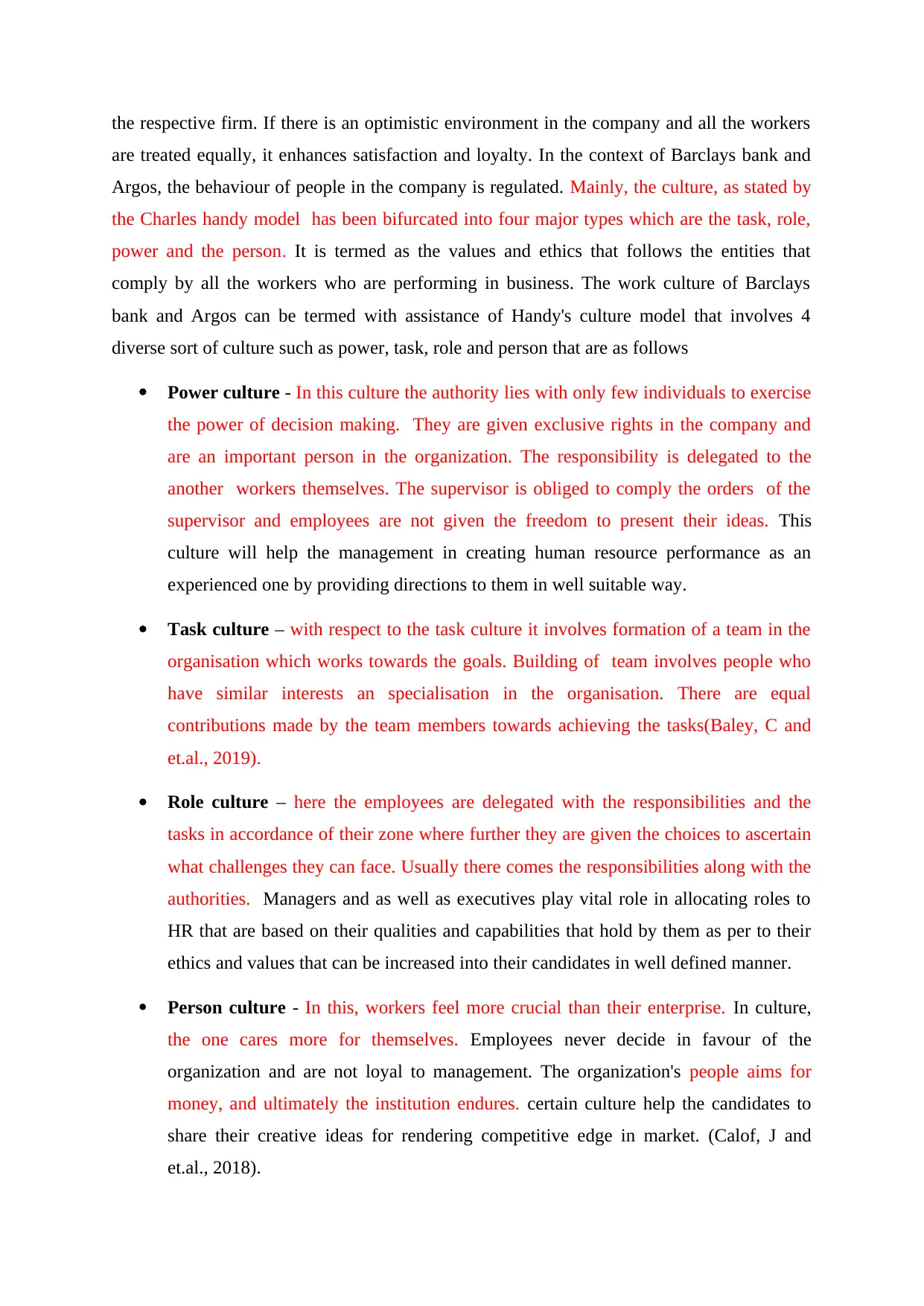
the respective firm. If there is an optimistic environment in the company and all the workers
are treated equally, it enhances satisfaction and loyalty. In the context of Barclays bank and
Argos, the behaviour of people in the company is regulated. Mainly, the culture, as stated by
the Charles handy model has been bifurcated into four major types which are the task, role,
power and the person. It is termed as the values and ethics that follows the entities that
comply by all the workers who are performing in business. The work culture of Barclays
bank and Argos can be termed with assistance of Handy's culture model that involves 4
diverse sort of culture such as power, task, role and person that are as follows
Power culture - In this culture the authority lies with only few individuals to exercise
the power of decision making. They are given exclusive rights in the company and
are an important person in the organization. The responsibility is delegated to the
another workers themselves. The supervisor is obliged to comply the orders of the
supervisor and employees are not given the freedom to present their ideas. This
culture will help the management in creating human resource performance as an
experienced one by providing directions to them in well suitable way.
Task culture – with respect to the task culture it involves formation of a team in the
organisation which works towards the goals. Building of team involves people who
have similar interests an specialisation in the organisation. There are equal
contributions made by the team members towards achieving the tasks(Baley, C and
et.al., 2019).
Role culture – here the employees are delegated with the responsibilities and the
tasks in accordance of their zone where further they are given the choices to ascertain
what challenges they can face. Usually there comes the responsibilities along with the
authorities. Managers and as well as executives play vital role in allocating roles to
HR that are based on their qualities and capabilities that hold by them as per to their
ethics and values that can be increased into their candidates in well defined manner.
Person culture - In this, workers feel more crucial than their enterprise. In culture,
the one cares more for themselves. Employees never decide in favour of the
organization and are not loyal to management. The organization's people aims for
money, and ultimately the institution endures. certain culture help the candidates to
share their creative ideas for rendering competitive edge in market. (Calof, J and
et.al., 2018).
are treated equally, it enhances satisfaction and loyalty. In the context of Barclays bank and
Argos, the behaviour of people in the company is regulated. Mainly, the culture, as stated by
the Charles handy model has been bifurcated into four major types which are the task, role,
power and the person. It is termed as the values and ethics that follows the entities that
comply by all the workers who are performing in business. The work culture of Barclays
bank and Argos can be termed with assistance of Handy's culture model that involves 4
diverse sort of culture such as power, task, role and person that are as follows
Power culture - In this culture the authority lies with only few individuals to exercise
the power of decision making. They are given exclusive rights in the company and
are an important person in the organization. The responsibility is delegated to the
another workers themselves. The supervisor is obliged to comply the orders of the
supervisor and employees are not given the freedom to present their ideas. This
culture will help the management in creating human resource performance as an
experienced one by providing directions to them in well suitable way.
Task culture – with respect to the task culture it involves formation of a team in the
organisation which works towards the goals. Building of team involves people who
have similar interests an specialisation in the organisation. There are equal
contributions made by the team members towards achieving the tasks(Baley, C and
et.al., 2019).
Role culture – here the employees are delegated with the responsibilities and the
tasks in accordance of their zone where further they are given the choices to ascertain
what challenges they can face. Usually there comes the responsibilities along with the
authorities. Managers and as well as executives play vital role in allocating roles to
HR that are based on their qualities and capabilities that hold by them as per to their
ethics and values that can be increased into their candidates in well defined manner.
Person culture - In this, workers feel more crucial than their enterprise. In culture,
the one cares more for themselves. Employees never decide in favour of the
organization and are not loyal to management. The organization's people aims for
money, and ultimately the institution endures. certain culture help the candidates to
share their creative ideas for rendering competitive edge in market. (Calof, J and
et.al., 2018).
Paraphrase This Document
Need a fresh take? Get an instant paraphrase of this document with our AI Paraphraser
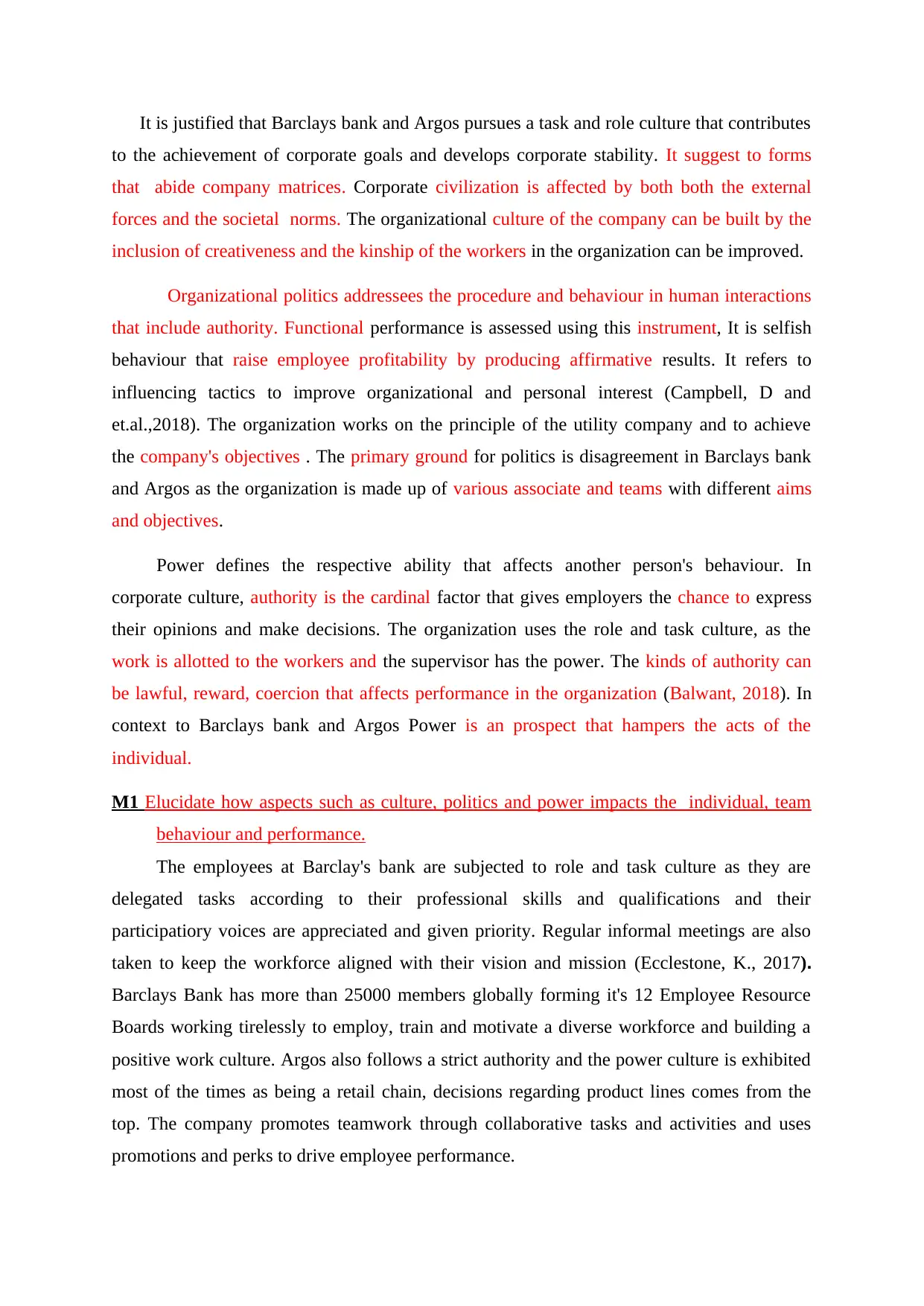
It is justified that Barclays bank and Argos pursues a task and role culture that contributes
to the achievement of corporate goals and develops corporate stability. It suggest to forms
that abide company matrices. Corporate civilization is affected by both both the external
forces and the societal norms. The organizational culture of the company can be built by the
inclusion of creativeness and the kinship of the workers in the organization can be improved.
Organizational politics addressees the procedure and behaviour in human interactions
that include authority. Functional performance is assessed using this instrument, It is selfish
behaviour that raise employee profitability by producing affirmative results. It refers to
influencing tactics to improve organizational and personal interest (Campbell, D and
et.al.,2018). The organization works on the principle of the utility company and to achieve
the company's objectives . The primary ground for politics is disagreement in Barclays bank
and Argos as the organization is made up of various associate and teams with different aims
and objectives.
Power defines the respective ability that affects another person's behaviour. In
corporate culture, authority is the cardinal factor that gives employers the chance to express
their opinions and make decisions. The organization uses the role and task culture, as the
work is allotted to the workers and the supervisor has the power. The kinds of authority can
be lawful, reward, coercion that affects performance in the organization (Balwant, 2018). In
context to Barclays bank and Argos Power is an prospect that hampers the acts of the
individual.
M1 Elucidate how aspects such as culture, politics and power impacts the individual, team
behaviour and performance.
The employees at Barclay's bank are subjected to role and task culture as they are
delegated tasks according to their professional skills and qualifications and their
participatiory voices are appreciated and given priority. Regular informal meetings are also
taken to keep the workforce aligned with their vision and mission (Ecclestone, K., 2017).
Barclays Bank has more than 25000 members globally forming it's 12 Employee Resource
Boards working tirelessly to employ, train and motivate a diverse workforce and building a
positive work culture. Argos also follows a strict authority and the power culture is exhibited
most of the times as being a retail chain, decisions regarding product lines comes from the
top. The company promotes teamwork through collaborative tasks and activities and uses
promotions and perks to drive employee performance.
to the achievement of corporate goals and develops corporate stability. It suggest to forms
that abide company matrices. Corporate civilization is affected by both both the external
forces and the societal norms. The organizational culture of the company can be built by the
inclusion of creativeness and the kinship of the workers in the organization can be improved.
Organizational politics addressees the procedure and behaviour in human interactions
that include authority. Functional performance is assessed using this instrument, It is selfish
behaviour that raise employee profitability by producing affirmative results. It refers to
influencing tactics to improve organizational and personal interest (Campbell, D and
et.al.,2018). The organization works on the principle of the utility company and to achieve
the company's objectives . The primary ground for politics is disagreement in Barclays bank
and Argos as the organization is made up of various associate and teams with different aims
and objectives.
Power defines the respective ability that affects another person's behaviour. In
corporate culture, authority is the cardinal factor that gives employers the chance to express
their opinions and make decisions. The organization uses the role and task culture, as the
work is allotted to the workers and the supervisor has the power. The kinds of authority can
be lawful, reward, coercion that affects performance in the organization (Balwant, 2018). In
context to Barclays bank and Argos Power is an prospect that hampers the acts of the
individual.
M1 Elucidate how aspects such as culture, politics and power impacts the individual, team
behaviour and performance.
The employees at Barclay's bank are subjected to role and task culture as they are
delegated tasks according to their professional skills and qualifications and their
participatiory voices are appreciated and given priority. Regular informal meetings are also
taken to keep the workforce aligned with their vision and mission (Ecclestone, K., 2017).
Barclays Bank has more than 25000 members globally forming it's 12 Employee Resource
Boards working tirelessly to employ, train and motivate a diverse workforce and building a
positive work culture. Argos also follows a strict authority and the power culture is exhibited
most of the times as being a retail chain, decisions regarding product lines comes from the
top. The company promotes teamwork through collaborative tasks and activities and uses
promotions and perks to drive employee performance.
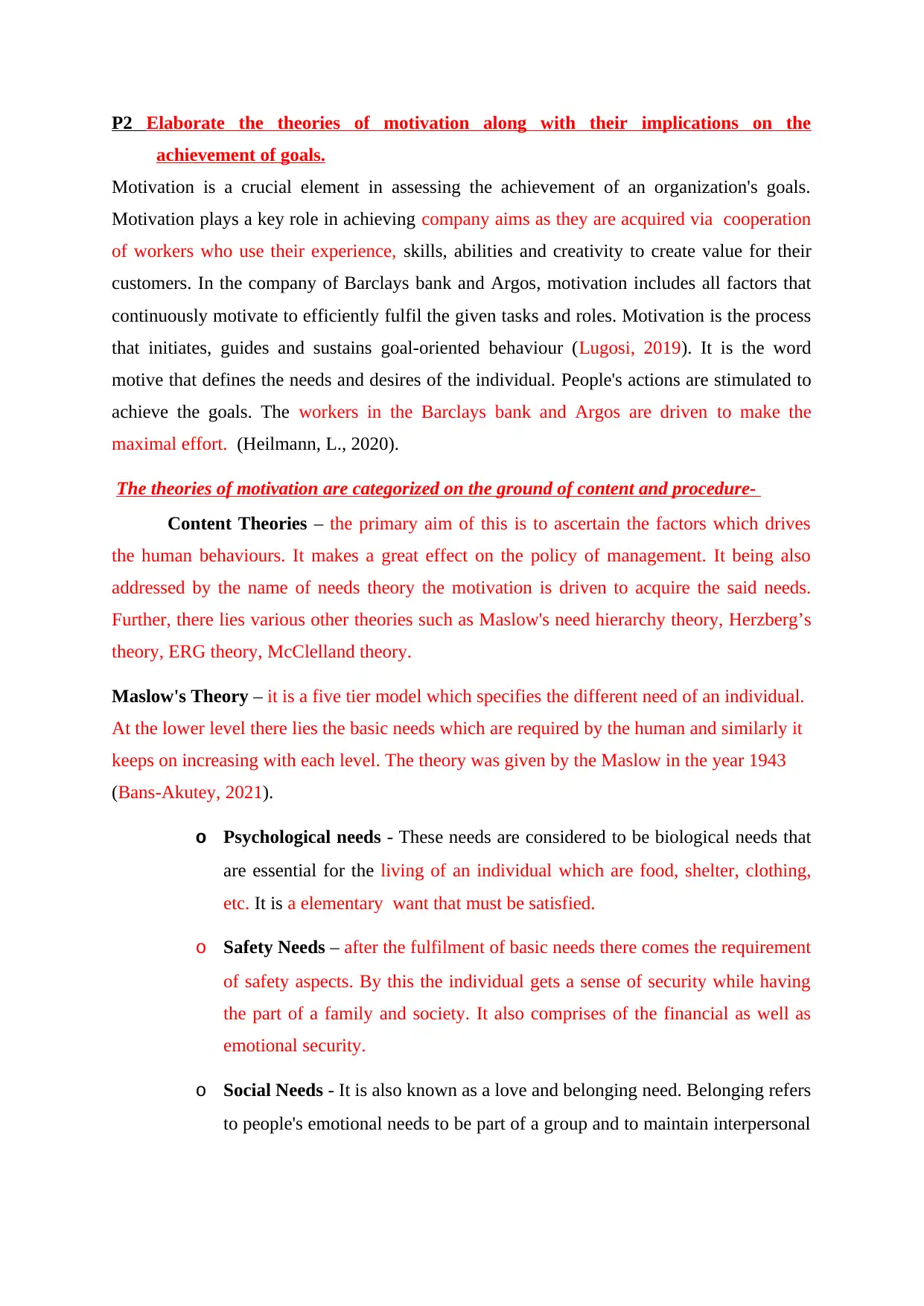
P2 Elaborate the theories of motivation along with their implications on the
achievement of goals.
Motivation is a crucial element in assessing the achievement of an organization's goals.
Motivation plays a key role in achieving company aims as they are acquired via cooperation
of workers who use their experience, skills, abilities and creativity to create value for their
customers. In the company of Barclays bank and Argos, motivation includes all factors that
continuously motivate to efficiently fulfil the given tasks and roles. Motivation is the process
that initiates, guides and sustains goal-oriented behaviour (Lugosi, 2019). It is the word
motive that defines the needs and desires of the individual. People's actions are stimulated to
achieve the goals. The workers in the Barclays bank and Argos are driven to make the
maximal effort. (Heilmann, L., 2020).
The theories of motivation are categorized on the ground of content and procedure-
Content Theories – the primary aim of this is to ascertain the factors which drives
the human behaviours. It makes a great effect on the policy of management. It being also
addressed by the name of needs theory the motivation is driven to acquire the said needs.
Further, there lies various other theories such as Maslow's need hierarchy theory, Herzberg’s
theory, ERG theory, McClelland theory.
Maslow's Theory – it is a five tier model which specifies the different need of an individual.
At the lower level there lies the basic needs which are required by the human and similarly it
keeps on increasing with each level. The theory was given by the Maslow in the year 1943
(Bans-Akutey, 2021).
o Psychological needs - These needs are considered to be biological needs that
are essential for the living of an individual which are food, shelter, clothing,
etc. It is a elementary want that must be satisfied.
o Safety Needs – after the fulfilment of basic needs there comes the requirement
of safety aspects. By this the individual gets a sense of security while having
the part of a family and society. It also comprises of the financial as well as
emotional security.
o Social Needs - It is also known as a love and belonging need. Belonging refers
to people's emotional needs to be part of a group and to maintain interpersonal
achievement of goals.
Motivation is a crucial element in assessing the achievement of an organization's goals.
Motivation plays a key role in achieving company aims as they are acquired via cooperation
of workers who use their experience, skills, abilities and creativity to create value for their
customers. In the company of Barclays bank and Argos, motivation includes all factors that
continuously motivate to efficiently fulfil the given tasks and roles. Motivation is the process
that initiates, guides and sustains goal-oriented behaviour (Lugosi, 2019). It is the word
motive that defines the needs and desires of the individual. People's actions are stimulated to
achieve the goals. The workers in the Barclays bank and Argos are driven to make the
maximal effort. (Heilmann, L., 2020).
The theories of motivation are categorized on the ground of content and procedure-
Content Theories – the primary aim of this is to ascertain the factors which drives
the human behaviours. It makes a great effect on the policy of management. It being also
addressed by the name of needs theory the motivation is driven to acquire the said needs.
Further, there lies various other theories such as Maslow's need hierarchy theory, Herzberg’s
theory, ERG theory, McClelland theory.
Maslow's Theory – it is a five tier model which specifies the different need of an individual.
At the lower level there lies the basic needs which are required by the human and similarly it
keeps on increasing with each level. The theory was given by the Maslow in the year 1943
(Bans-Akutey, 2021).
o Psychological needs - These needs are considered to be biological needs that
are essential for the living of an individual which are food, shelter, clothing,
etc. It is a elementary want that must be satisfied.
o Safety Needs – after the fulfilment of basic needs there comes the requirement
of safety aspects. By this the individual gets a sense of security while having
the part of a family and society. It also comprises of the financial as well as
emotional security.
o Social Needs - It is also known as a love and belonging need. Belonging refers
to people's emotional needs to be part of a group and to maintain interpersonal
⊘ This is a preview!⊘
Do you want full access?
Subscribe today to unlock all pages.

Trusted by 1+ million students worldwide
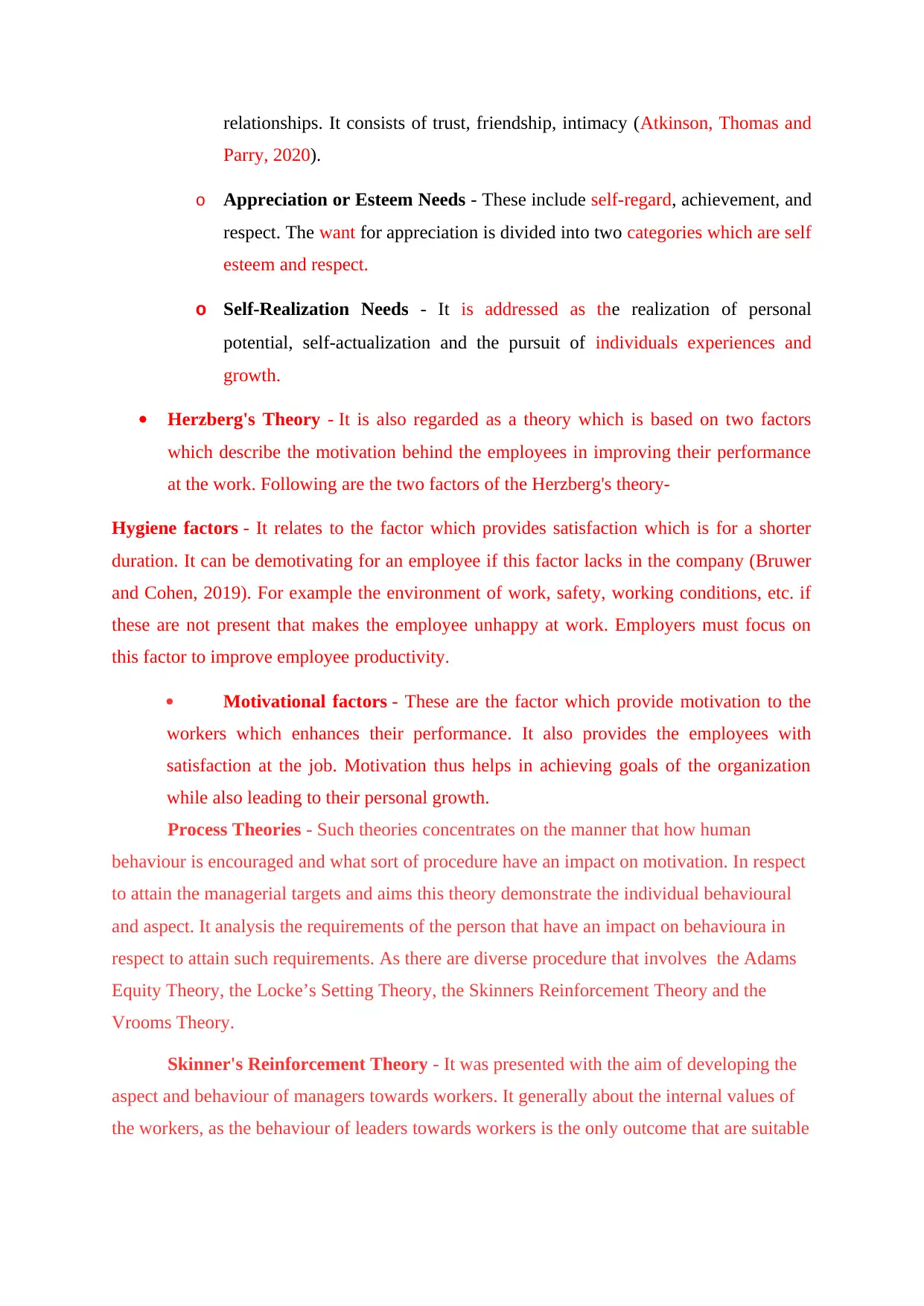
relationships. It consists of trust, friendship, intimacy (Atkinson, Thomas and
Parry, 2020).
o Appreciation or Esteem Needs - These include self-regard, achievement, and
respect. The want for appreciation is divided into two categories which are self
esteem and respect.
o Self-Realization Needs - It is addressed as the realization of personal
potential, self-actualization and the pursuit of individuals experiences and
growth.
Herzberg's Theory - It is also regarded as a theory which is based on two factors
which describe the motivation behind the employees in improving their performance
at the work. Following are the two factors of the Herzberg's theory-
Hygiene factors - It relates to the factor which provides satisfaction which is for a shorter
duration. It can be demotivating for an employee if this factor lacks in the company (Bruwer
and Cohen, 2019). For example the environment of work, safety, working conditions, etc. if
these are not present that makes the employee unhappy at work. Employers must focus on
this factor to improve employee productivity.
Motivational factors - These are the factor which provide motivation to the
workers which enhances their performance. It also provides the employees with
satisfaction at the job. Motivation thus helps in achieving goals of the organization
while also leading to their personal growth.
Process Theories - Such theories concentrates on the manner that how human
behaviour is encouraged and what sort of procedure have an impact on motivation. In respect
to attain the managerial targets and aims this theory demonstrate the individual behavioural
and aspect. It analysis the requirements of the person that have an impact on behavioura in
respect to attain such requirements. As there are diverse procedure that involves the Adams
Equity Theory, the Locke’s Setting Theory, the Skinners Reinforcement Theory and the
Vrooms Theory.
Skinner's Reinforcement Theory - It was presented with the aim of developing the
aspect and behaviour of managers towards workers. It generally about the internal values of
the workers, as the behaviour of leaders towards workers is the only outcome that are suitable
Parry, 2020).
o Appreciation or Esteem Needs - These include self-regard, achievement, and
respect. The want for appreciation is divided into two categories which are self
esteem and respect.
o Self-Realization Needs - It is addressed as the realization of personal
potential, self-actualization and the pursuit of individuals experiences and
growth.
Herzberg's Theory - It is also regarded as a theory which is based on two factors
which describe the motivation behind the employees in improving their performance
at the work. Following are the two factors of the Herzberg's theory-
Hygiene factors - It relates to the factor which provides satisfaction which is for a shorter
duration. It can be demotivating for an employee if this factor lacks in the company (Bruwer
and Cohen, 2019). For example the environment of work, safety, working conditions, etc. if
these are not present that makes the employee unhappy at work. Employers must focus on
this factor to improve employee productivity.
Motivational factors - These are the factor which provide motivation to the
workers which enhances their performance. It also provides the employees with
satisfaction at the job. Motivation thus helps in achieving goals of the organization
while also leading to their personal growth.
Process Theories - Such theories concentrates on the manner that how human
behaviour is encouraged and what sort of procedure have an impact on motivation. In respect
to attain the managerial targets and aims this theory demonstrate the individual behavioural
and aspect. It analysis the requirements of the person that have an impact on behavioura in
respect to attain such requirements. As there are diverse procedure that involves the Adams
Equity Theory, the Locke’s Setting Theory, the Skinners Reinforcement Theory and the
Vrooms Theory.
Skinner's Reinforcement Theory - It was presented with the aim of developing the
aspect and behaviour of managers towards workers. It generally about the internal values of
the workers, as the behaviour of leaders towards workers is the only outcome that are suitable
Paraphrase This Document
Need a fresh take? Get an instant paraphrase of this document with our AI Paraphraser
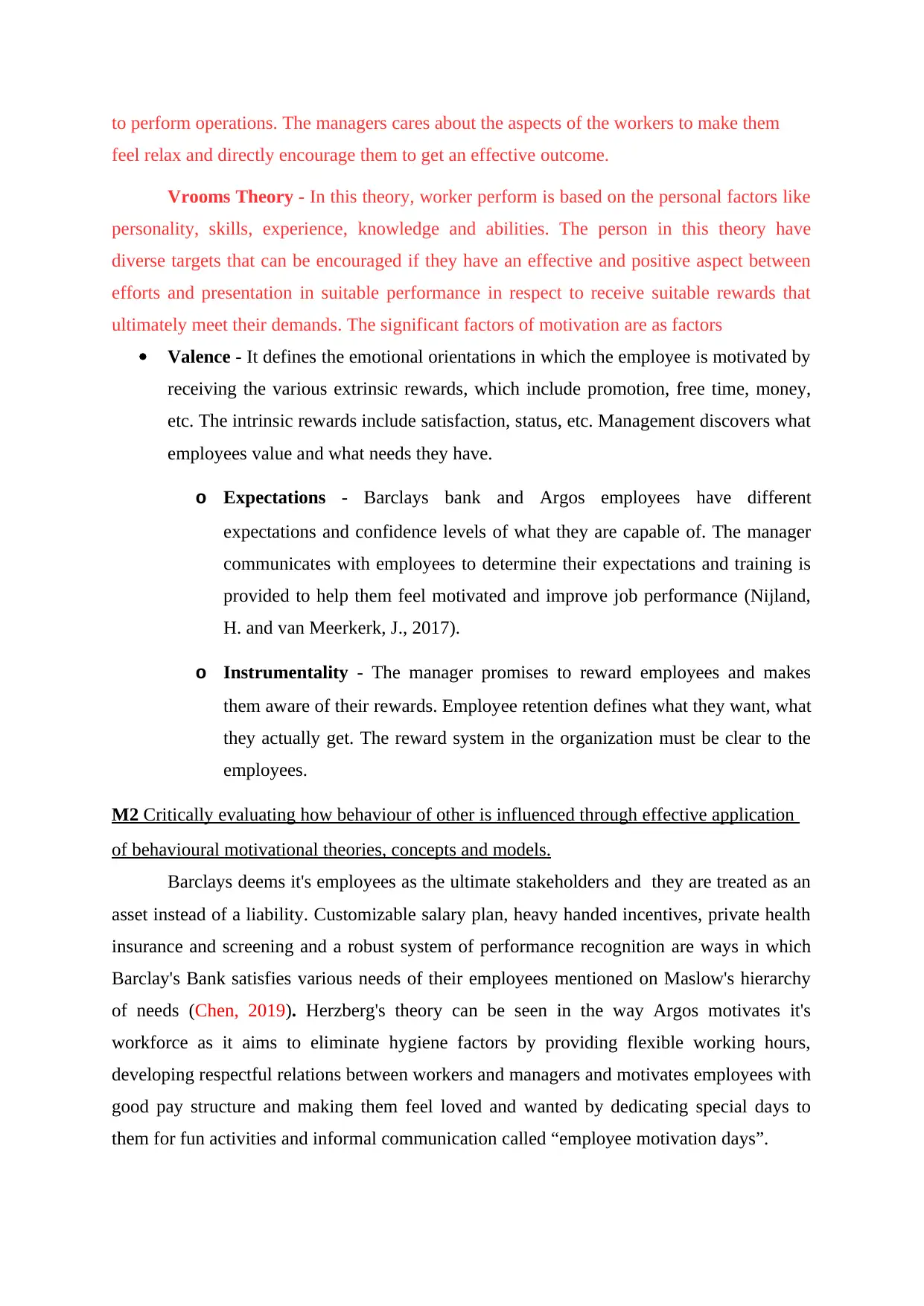
to perform operations. The managers cares about the aspects of the workers to make them
feel relax and directly encourage them to get an effective outcome.
Vrooms Theory - In this theory, worker perform is based on the personal factors like
personality, skills, experience, knowledge and abilities. The person in this theory have
diverse targets that can be encouraged if they have an effective and positive aspect between
efforts and presentation in suitable performance in respect to receive suitable rewards that
ultimately meet their demands. The significant factors of motivation are as factors
Valence - It defines the emotional orientations in which the employee is motivated by
receiving the various extrinsic rewards, which include promotion, free time, money,
etc. The intrinsic rewards include satisfaction, status, etc. Management discovers what
employees value and what needs they have.
o Expectations - Barclays bank and Argos employees have different
expectations and confidence levels of what they are capable of. The manager
communicates with employees to determine their expectations and training is
provided to help them feel motivated and improve job performance (Nijland,
H. and van Meerkerk, J., 2017).
o Instrumentality - The manager promises to reward employees and makes
them aware of their rewards. Employee retention defines what they want, what
they actually get. The reward system in the organization must be clear to the
employees.
M2 Critically evaluating how behaviour of other is influenced through effective application
of behavioural motivational theories, concepts and models.
Barclays deems it's employees as the ultimate stakeholders and they are treated as an
asset instead of a liability. Customizable salary plan, heavy handed incentives, private health
insurance and screening and a robust system of performance recognition are ways in which
Barclay's Bank satisfies various needs of their employees mentioned on Maslow's hierarchy
of needs (Chen, 2019). Herzberg's theory can be seen in the way Argos motivates it's
workforce as it aims to eliminate hygiene factors by providing flexible working hours,
developing respectful relations between workers and managers and motivates employees with
good pay structure and making them feel loved and wanted by dedicating special days to
them for fun activities and informal communication called “employee motivation days”.
feel relax and directly encourage them to get an effective outcome.
Vrooms Theory - In this theory, worker perform is based on the personal factors like
personality, skills, experience, knowledge and abilities. The person in this theory have
diverse targets that can be encouraged if they have an effective and positive aspect between
efforts and presentation in suitable performance in respect to receive suitable rewards that
ultimately meet their demands. The significant factors of motivation are as factors
Valence - It defines the emotional orientations in which the employee is motivated by
receiving the various extrinsic rewards, which include promotion, free time, money,
etc. The intrinsic rewards include satisfaction, status, etc. Management discovers what
employees value and what needs they have.
o Expectations - Barclays bank and Argos employees have different
expectations and confidence levels of what they are capable of. The manager
communicates with employees to determine their expectations and training is
provided to help them feel motivated and improve job performance (Nijland,
H. and van Meerkerk, J., 2017).
o Instrumentality - The manager promises to reward employees and makes
them aware of their rewards. Employee retention defines what they want, what
they actually get. The reward system in the organization must be clear to the
employees.
M2 Critically evaluating how behaviour of other is influenced through effective application
of behavioural motivational theories, concepts and models.
Barclays deems it's employees as the ultimate stakeholders and they are treated as an
asset instead of a liability. Customizable salary plan, heavy handed incentives, private health
insurance and screening and a robust system of performance recognition are ways in which
Barclay's Bank satisfies various needs of their employees mentioned on Maslow's hierarchy
of needs (Chen, 2019). Herzberg's theory can be seen in the way Argos motivates it's
workforce as it aims to eliminate hygiene factors by providing flexible working hours,
developing respectful relations between workers and managers and motivates employees with
good pay structure and making them feel loved and wanted by dedicating special days to
them for fun activities and informal communication called “employee motivation days”.
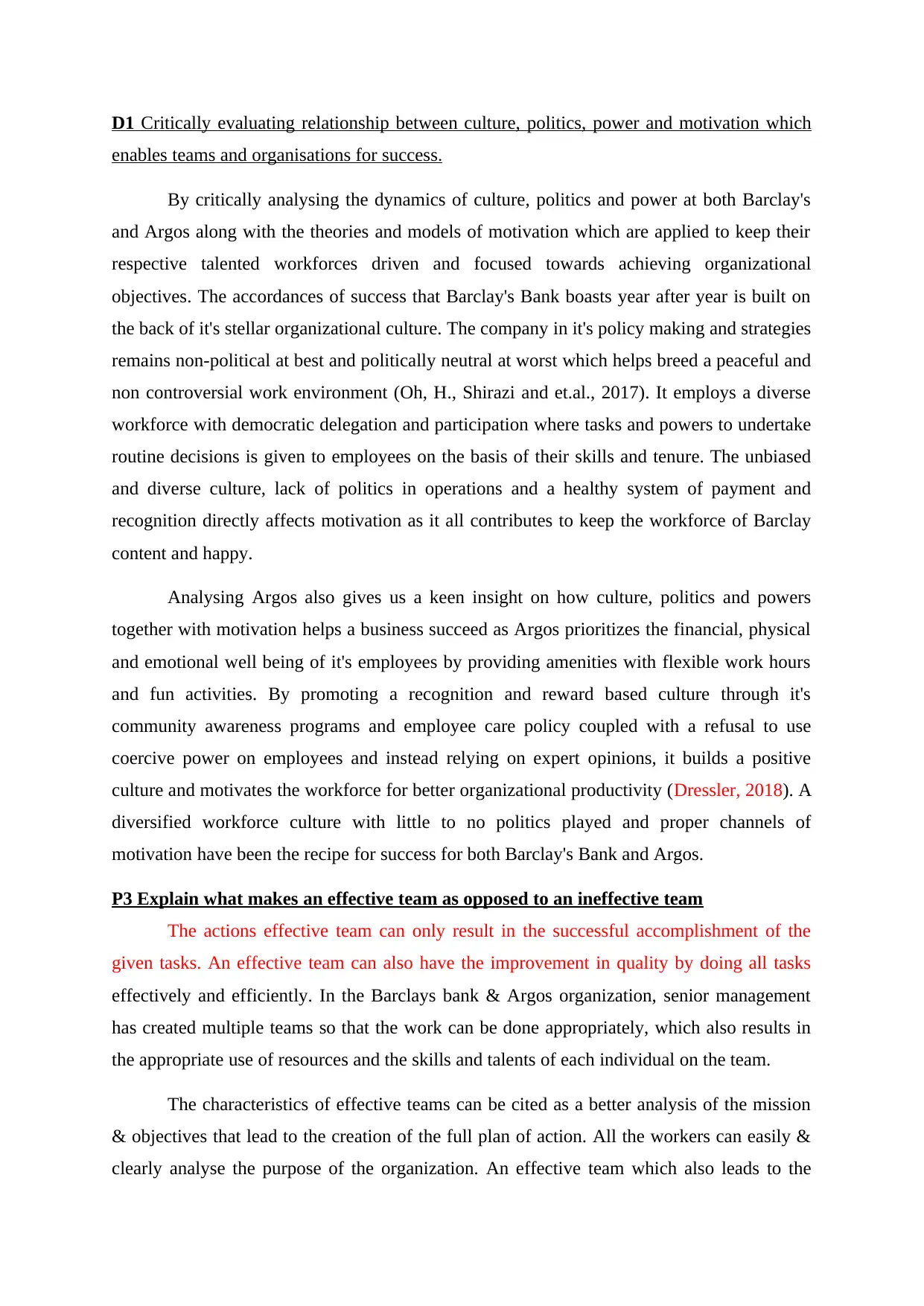
D1 Critically evaluating relationship between culture, politics, power and motivation which
enables teams and organisations for success.
By critically analysing the dynamics of culture, politics and power at both Barclay's
and Argos along with the theories and models of motivation which are applied to keep their
respective talented workforces driven and focused towards achieving organizational
objectives. The accordances of success that Barclay's Bank boasts year after year is built on
the back of it's stellar organizational culture. The company in it's policy making and strategies
remains non-political at best and politically neutral at worst which helps breed a peaceful and
non controversial work environment (Oh, H., Shirazi and et.al., 2017). It employs a diverse
workforce with democratic delegation and participation where tasks and powers to undertake
routine decisions is given to employees on the basis of their skills and tenure. The unbiased
and diverse culture, lack of politics in operations and a healthy system of payment and
recognition directly affects motivation as it all contributes to keep the workforce of Barclay
content and happy.
Analysing Argos also gives us a keen insight on how culture, politics and powers
together with motivation helps a business succeed as Argos prioritizes the financial, physical
and emotional well being of it's employees by providing amenities with flexible work hours
and fun activities. By promoting a recognition and reward based culture through it's
community awareness programs and employee care policy coupled with a refusal to use
coercive power on employees and instead relying on expert opinions, it builds a positive
culture and motivates the workforce for better organizational productivity (Dressler, 2018). A
diversified workforce culture with little to no politics played and proper channels of
motivation have been the recipe for success for both Barclay's Bank and Argos.
P3 Explain what makes an effective team as opposed to an ineffective team
The actions effective team can only result in the successful accomplishment of the
given tasks. An effective team can also have the improvement in quality by doing all tasks
effectively and efficiently. In the Barclays bank & Argos organization, senior management
has created multiple teams so that the work can be done appropriately, which also results in
the appropriate use of resources and the skills and talents of each individual on the team.
The characteristics of effective teams can be cited as a better analysis of the mission
& objectives that lead to the creation of the full plan of action. All the workers can easily &
clearly analyse the purpose of the organization. An effective team which also leads to the
enables teams and organisations for success.
By critically analysing the dynamics of culture, politics and power at both Barclay's
and Argos along with the theories and models of motivation which are applied to keep their
respective talented workforces driven and focused towards achieving organizational
objectives. The accordances of success that Barclay's Bank boasts year after year is built on
the back of it's stellar organizational culture. The company in it's policy making and strategies
remains non-political at best and politically neutral at worst which helps breed a peaceful and
non controversial work environment (Oh, H., Shirazi and et.al., 2017). It employs a diverse
workforce with democratic delegation and participation where tasks and powers to undertake
routine decisions is given to employees on the basis of their skills and tenure. The unbiased
and diverse culture, lack of politics in operations and a healthy system of payment and
recognition directly affects motivation as it all contributes to keep the workforce of Barclay
content and happy.
Analysing Argos also gives us a keen insight on how culture, politics and powers
together with motivation helps a business succeed as Argos prioritizes the financial, physical
and emotional well being of it's employees by providing amenities with flexible work hours
and fun activities. By promoting a recognition and reward based culture through it's
community awareness programs and employee care policy coupled with a refusal to use
coercive power on employees and instead relying on expert opinions, it builds a positive
culture and motivates the workforce for better organizational productivity (Dressler, 2018). A
diversified workforce culture with little to no politics played and proper channels of
motivation have been the recipe for success for both Barclay's Bank and Argos.
P3 Explain what makes an effective team as opposed to an ineffective team
The actions effective team can only result in the successful accomplishment of the
given tasks. An effective team can also have the improvement in quality by doing all tasks
effectively and efficiently. In the Barclays bank & Argos organization, senior management
has created multiple teams so that the work can be done appropriately, which also results in
the appropriate use of resources and the skills and talents of each individual on the team.
The characteristics of effective teams can be cited as a better analysis of the mission
& objectives that lead to the creation of the full plan of action. All the workers can easily &
clearly analyse the purpose of the organization. An effective team which also leads to the
⊘ This is a preview!⊘
Do you want full access?
Subscribe today to unlock all pages.

Trusted by 1+ million students worldwide
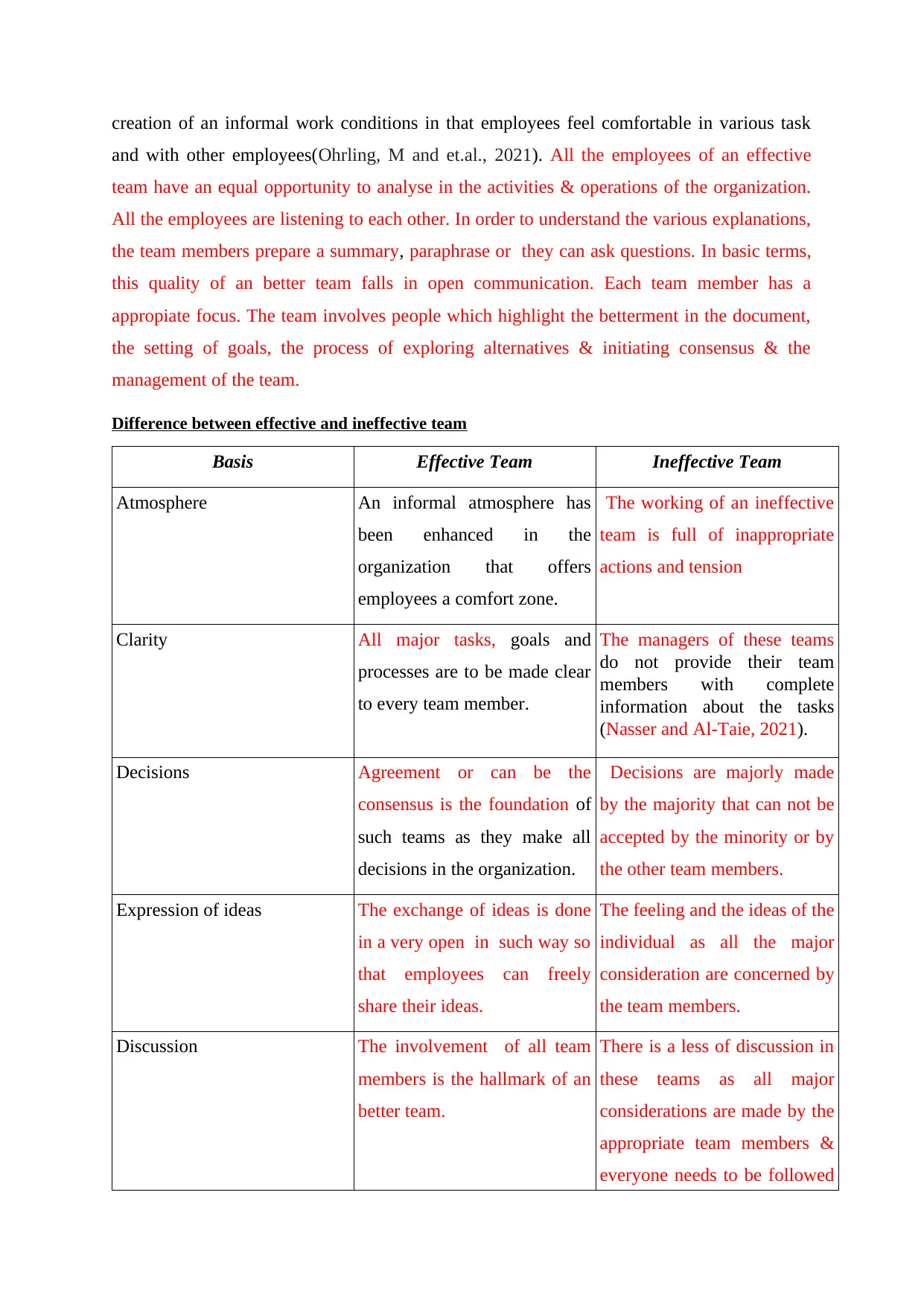
creation of an informal work conditions in that employees feel comfortable in various task
and with other employees(Ohrling, M and et.al., 2021). All the employees of an effective
team have an equal opportunity to analyse in the activities & operations of the organization.
All the employees are listening to each other. In order to understand the various explanations,
the team members prepare a summary, paraphrase or they can ask questions. In basic terms,
this quality of an better team falls in open communication. Each team member has a
appropiate focus. The team involves people which highlight the betterment in the document,
the setting of goals, the process of exploring alternatives & initiating consensus & the
management of the team.
Difference between effective and ineffective team
Basis Effective Team Ineffective Team
Atmosphere An informal atmosphere has
been enhanced in the
organization that offers
employees a comfort zone.
The working of an ineffective
team is full of inappropriate
actions and tension
Clarity All major tasks, goals and
processes are to be made clear
to every team member.
The managers of these teams
do not provide their team
members with complete
information about the tasks
(Nasser and Al-Taie, 2021).
Decisions Agreement or can be the
consensus is the foundation of
such teams as they make all
decisions in the organization.
Decisions are majorly made
by the majority that can not be
accepted by the minority or by
the other team members.
Expression of ideas The exchange of ideas is done
in a very open in such way so
that employees can freely
share their ideas.
The feeling and the ideas of the
individual as all the major
consideration are concerned by
the team members.
Discussion The involvement of all team
members is the hallmark of an
better team.
There is a less of discussion in
these teams as all major
considerations are made by the
appropriate team members &
everyone needs to be followed
and with other employees(Ohrling, M and et.al., 2021). All the employees of an effective
team have an equal opportunity to analyse in the activities & operations of the organization.
All the employees are listening to each other. In order to understand the various explanations,
the team members prepare a summary, paraphrase or they can ask questions. In basic terms,
this quality of an better team falls in open communication. Each team member has a
appropiate focus. The team involves people which highlight the betterment in the document,
the setting of goals, the process of exploring alternatives & initiating consensus & the
management of the team.
Difference between effective and ineffective team
Basis Effective Team Ineffective Team
Atmosphere An informal atmosphere has
been enhanced in the
organization that offers
employees a comfort zone.
The working of an ineffective
team is full of inappropriate
actions and tension
Clarity All major tasks, goals and
processes are to be made clear
to every team member.
The managers of these teams
do not provide their team
members with complete
information about the tasks
(Nasser and Al-Taie, 2021).
Decisions Agreement or can be the
consensus is the foundation of
such teams as they make all
decisions in the organization.
Decisions are majorly made
by the majority that can not be
accepted by the minority or by
the other team members.
Expression of ideas The exchange of ideas is done
in a very open in such way so
that employees can freely
share their ideas.
The feeling and the ideas of the
individual as all the major
consideration are concerned by
the team members.
Discussion The involvement of all team
members is the hallmark of an
better team.
There is a less of discussion in
these teams as all major
considerations are made by the
appropriate team members &
everyone needs to be followed
Paraphrase This Document
Need a fresh take? Get an instant paraphrase of this document with our AI Paraphraser
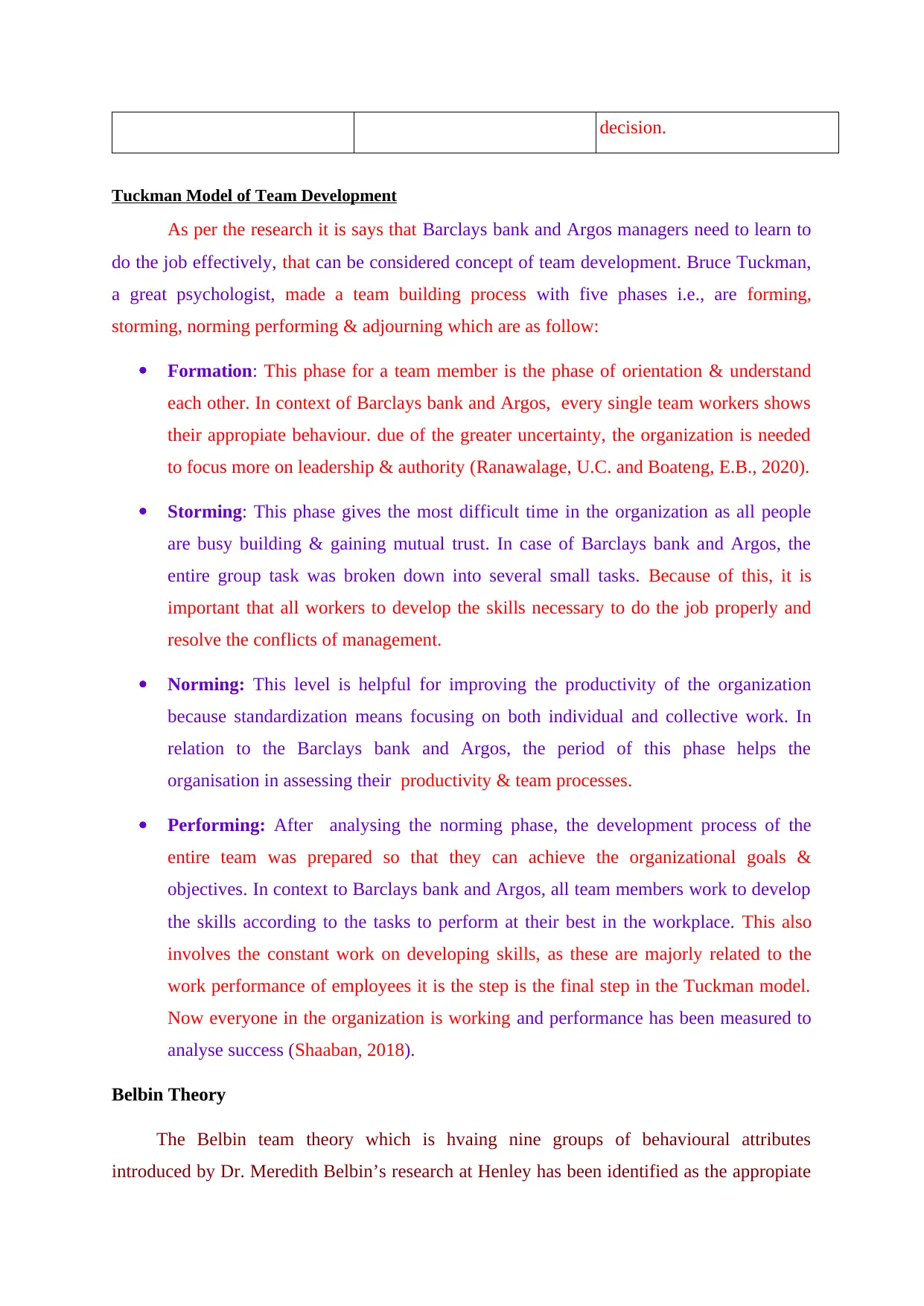
decision.
Tuckman Model of Team Development
As per the research it is says that Barclays bank and Argos managers need to learn to
do the job effectively, that can be considered concept of team development. Bruce Tuckman,
a great psychologist, made a team building process with five phases i.e., are forming,
storming, norming performing & adjourning which are as follow:
Formation: This phase for a team member is the phase of orientation & understand
each other. In context of Barclays bank and Argos, every single team workers shows
their appropiate behaviour. due of the greater uncertainty, the organization is needed
to focus more on leadership & authority (Ranawalage, U.C. and Boateng, E.B., 2020).
Storming: This phase gives the most difficult time in the organization as all people
are busy building & gaining mutual trust. In case of Barclays bank and Argos, the
entire group task was broken down into several small tasks. Because of this, it is
important that all workers to develop the skills necessary to do the job properly and
resolve the conflicts of management.
Norming: This level is helpful for improving the productivity of the organization
because standardization means focusing on both individual and collective work. In
relation to the Barclays bank and Argos, the period of this phase helps the
organisation in assessing their productivity & team processes.
Performing: After analysing the norming phase, the development process of the
entire team was prepared so that they can achieve the organizational goals &
objectives. In context to Barclays bank and Argos, all team members work to develop
the skills according to the tasks to perform at their best in the workplace. This also
involves the constant work on developing skills, as these are majorly related to the
work performance of employees it is the step is the final step in the Tuckman model.
Now everyone in the organization is working and performance has been measured to
analyse success (Shaaban, 2018).
Belbin Theory
The Belbin team theory which is hvaing nine groups of behavioural attributes
introduced by Dr. Meredith Belbin’s research at Henley has been identified as the appropiate
Tuckman Model of Team Development
As per the research it is says that Barclays bank and Argos managers need to learn to
do the job effectively, that can be considered concept of team development. Bruce Tuckman,
a great psychologist, made a team building process with five phases i.e., are forming,
storming, norming performing & adjourning which are as follow:
Formation: This phase for a team member is the phase of orientation & understand
each other. In context of Barclays bank and Argos, every single team workers shows
their appropiate behaviour. due of the greater uncertainty, the organization is needed
to focus more on leadership & authority (Ranawalage, U.C. and Boateng, E.B., 2020).
Storming: This phase gives the most difficult time in the organization as all people
are busy building & gaining mutual trust. In case of Barclays bank and Argos, the
entire group task was broken down into several small tasks. Because of this, it is
important that all workers to develop the skills necessary to do the job properly and
resolve the conflicts of management.
Norming: This level is helpful for improving the productivity of the organization
because standardization means focusing on both individual and collective work. In
relation to the Barclays bank and Argos, the period of this phase helps the
organisation in assessing their productivity & team processes.
Performing: After analysing the norming phase, the development process of the
entire team was prepared so that they can achieve the organizational goals &
objectives. In context to Barclays bank and Argos, all team members work to develop
the skills according to the tasks to perform at their best in the workplace. This also
involves the constant work on developing skills, as these are majorly related to the
work performance of employees it is the step is the final step in the Tuckman model.
Now everyone in the organization is working and performance has been measured to
analyse success (Shaaban, 2018).
Belbin Theory
The Belbin team theory which is hvaing nine groups of behavioural attributes
introduced by Dr. Meredith Belbin’s research at Henley has been identified as the appropiate
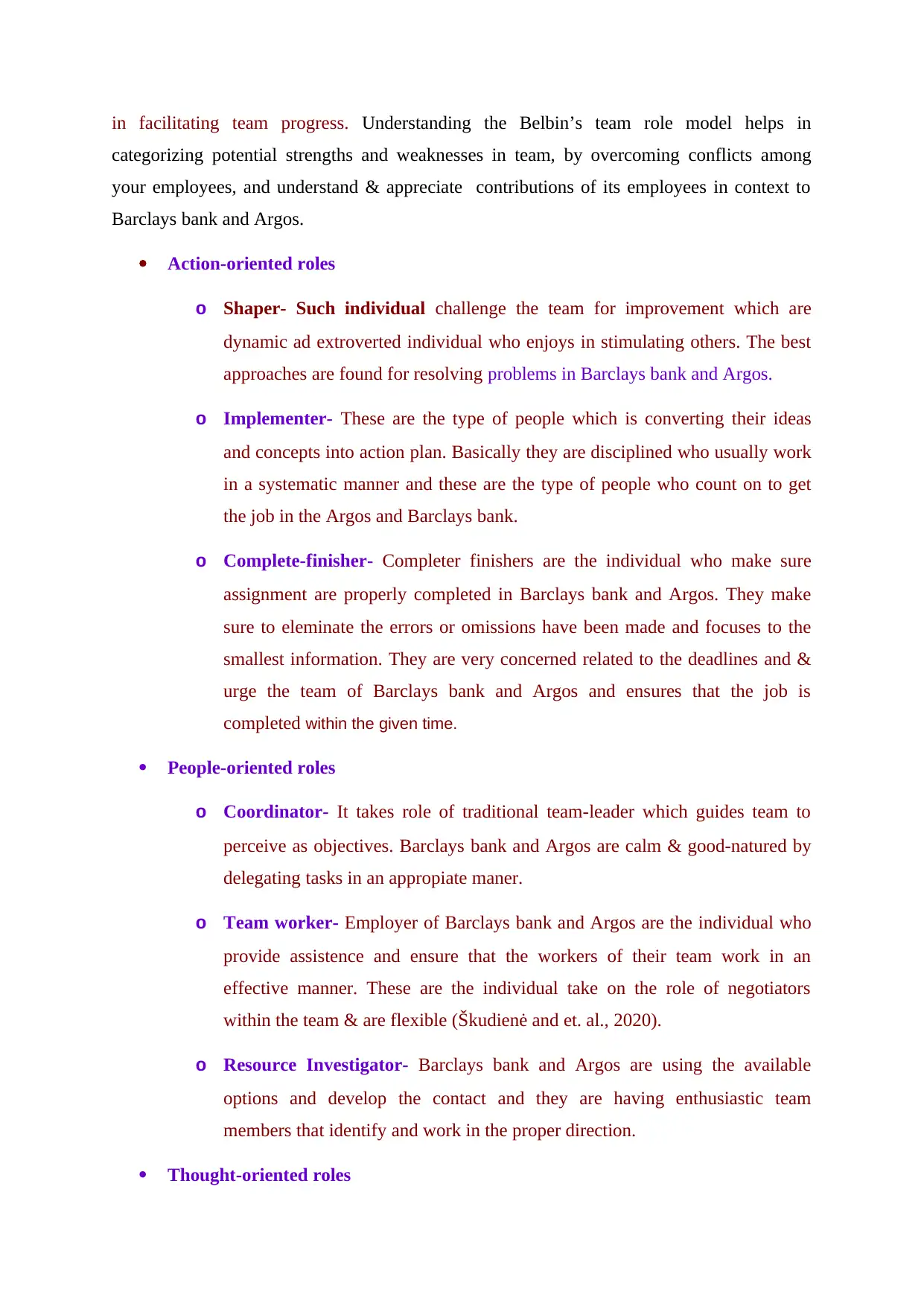
in facilitating team progress. Understanding the Belbin’s team role model helps in
categorizing potential strengths and weaknesses in team, by overcoming conflicts among
your employees, and understand & appreciate contributions of its employees in context to
Barclays bank and Argos.
Action-oriented roles
o Shaper- Such individual challenge the team for improvement which are
dynamic ad extroverted individual who enjoys in stimulating others. The best
approaches are found for resolving problems in Barclays bank and Argos.
o Implementer- These are the type of people which is converting their ideas
and concepts into action plan. Basically they are disciplined who usually work
in a systematic manner and these are the type of people who count on to get
the job in the Argos and Barclays bank.
o Complete-finisher- Completer finishers are the individual who make sure
assignment are properly completed in Barclays bank and Argos. They make
sure to eleminate the errors or omissions have been made and focuses to the
smallest information. They are very concerned related to the deadlines and &
urge the team of Barclays bank and Argos and ensures that the job is
completed within the given time.
People-oriented roles
o Coordinator- It takes role of traditional team-leader which guides team to
perceive as objectives. Barclays bank and Argos are calm & good-natured by
delegating tasks in an appropiate maner.
o Team worker- Employer of Barclays bank and Argos are the individual who
provide assistence and ensure that the workers of their team work in an
effective manner. These are the individual take on the role of negotiators
within the team & are flexible (Škudienė and et. al., 2020).
o Resource Investigator- Barclays bank and Argos are using the available
options and develop the contact and they are having enthusiastic team
members that identify and work in the proper direction.
Thought-oriented roles
categorizing potential strengths and weaknesses in team, by overcoming conflicts among
your employees, and understand & appreciate contributions of its employees in context to
Barclays bank and Argos.
Action-oriented roles
o Shaper- Such individual challenge the team for improvement which are
dynamic ad extroverted individual who enjoys in stimulating others. The best
approaches are found for resolving problems in Barclays bank and Argos.
o Implementer- These are the type of people which is converting their ideas
and concepts into action plan. Basically they are disciplined who usually work
in a systematic manner and these are the type of people who count on to get
the job in the Argos and Barclays bank.
o Complete-finisher- Completer finishers are the individual who make sure
assignment are properly completed in Barclays bank and Argos. They make
sure to eleminate the errors or omissions have been made and focuses to the
smallest information. They are very concerned related to the deadlines and &
urge the team of Barclays bank and Argos and ensures that the job is
completed within the given time.
People-oriented roles
o Coordinator- It takes role of traditional team-leader which guides team to
perceive as objectives. Barclays bank and Argos are calm & good-natured by
delegating tasks in an appropiate maner.
o Team worker- Employer of Barclays bank and Argos are the individual who
provide assistence and ensure that the workers of their team work in an
effective manner. These are the individual take on the role of negotiators
within the team & are flexible (Škudienė and et. al., 2020).
o Resource Investigator- Barclays bank and Argos are using the available
options and develop the contact and they are having enthusiastic team
members that identify and work in the proper direction.
Thought-oriented roles
⊘ This is a preview!⊘
Do you want full access?
Subscribe today to unlock all pages.

Trusted by 1+ million students worldwide
1 out of 19
Related Documents
Your All-in-One AI-Powered Toolkit for Academic Success.
+13062052269
info@desklib.com
Available 24*7 on WhatsApp / Email
![[object Object]](/_next/static/media/star-bottom.7253800d.svg)
Unlock your academic potential
Copyright © 2020–2026 A2Z Services. All Rights Reserved. Developed and managed by ZUCOL.



